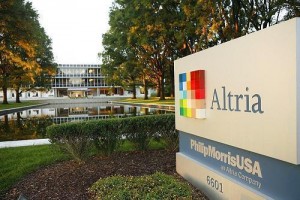By Edward L. Sweda, J.D.
In sharp contrast to the manner in which management at Reynolds American, Inc. conducted its annual meeting of shareholders a week earlier, Altria Group, Inc.’s Chairman and Chief Executive Officer Martin J. Barrington treated everyone at the May 16th meeting in Richmond, Virginia with courtesy and politeness.
Barrington began his presentation by commending the Altria Board of Directors’ “strong leadership and oversight.” He touted “strong results in 2012” and declared that the company’s “main brands did well.” Citing the company’s 9000 employees, Barrington praised the company for being a founding member of the Farm Labor Practices Group, supporting the arts and investing in communities. He admitted that “more needs to be done to discourage youth tobacco use” and, without giving any data showing how the program discourages youth tobacco use, praised Altria’s “We Card” program.
Barrington reported increased market share for Marlboro (in red, green, gold and black) cigarettes and progress for Black & Mild (tipped cigarillos) and the two major smokeless tobacco brands of Skoal and Copenhagen. He informed the audience that the company would introduce NuMark, a brand of e-cigarettes, in the second half of 2013.
Altria’s CEO also assured shareholders that the company’s outlook for 2013 is good; he noted that Altria had increased dividends six separate times since 2008. Also, Altria’s shareholder returns had increased by 84.2% during the span of 2008 to 2012.
On the topic of tobacco litigation, Barrington declared that the company had “success in managing litigation,” mentioned the ongoing Brown case in California dealing with light cigarettes and said that Altria has “strong defenses” as it continues to defend Engle Progeny cases in Florida.
A shareholder resolution, submitted by the Province of St. Joseph of the Capuchin Order in Milwaukee, dealt with the issue of disclosure of the company’s lobbying policies and practices. Specifically, it called on the Board of Directors to prepare a report, to be updated annually, for shareholders disclosing the following:
- “Company policy and procedures governing lobbying, both direct and indirect, and Grassroots lobbying communications;
- “Payments by Altria used for (a) direct or indirect lobbying or (b) grassroots lobbying communications, in each case including the amount of the payment and the recipient;
- “Altria’s membership in and payments to any tax-exempt organization that writes and endorses model legislation; and
- “Description of the decision making process and oversight by management and the Board for making payments described in section 2 above.
Fr. Michael Crosby presented the resolution. He stressed that, while Altria has disclosed its payments to political candidates, it has kept largely secret the details about its spending on lobbying and making contributions to third-party organizations such as ALEC, the American Legislative Exchange Council. The resolution’s supporting statement pointed out that “Altria spent approximately $21.37 million in 2010 and 2011 on direct federal lobbying activities” but that these figures “do not include lobbying expenditures to influence legislation in states.”
This author then spoke in support of the “modest, pro-transparency resolution” and described the opposition to the resolution by Altria’s management as “short-sighted.” The company had described the reports required by the proposal as imposing “additional and unnecessary burdens and costs on the Company and would not be in the best interests of the Company and its shareholders.”
The results of preliminary voting were reported that the resolution was defeated with supporters garnering 21.82% of the votes cast.
During the question and answer session, to which thirty minutes were allotted, this author noted that Altria had suffered a major setback in mid-March when the Florida Supreme Court ruled 6-1 that the way dozens of Engle Progeny trials have been conducted since February 2009 does not violate the tobacco companies’ due process rights. I concluded my observations about this litigation with the question: Why shouldn’t shareholders believe tobacco company attorneys who have warned about “massive liability” with thousands of Engle Progeny cases still in the pipeline with “no end in sight,” rather than believing the optimistic assurances from management?
Barrington’s response was to acknowledge that litigation is a “challenge” and to refer shareholders to the company’s 10-Q report (PDF), which covers litigation in detail.
Fr. Crosby noted that heavy users of cigarettes are often those who are at the lowest rung of the economic ladder. “What steps will Altria Group take to reduce consumption of its tobacco products by the poor?” Rev. Crosby asked. Mr. Barrington simply cited the company’s programs to reduce youth consumption without addressing low-income adult smokers. Even after a follow-up question by Fr. Crosby, Barrington refused to commit any company resources to trying to discourage tobacco consumption among low-income adults.
After the 67-minute meeting had been adjourned, Altria Group, Inc., with its Marlboro brand having increased its market share of cigarettes by two-tenths of a percentage point in the first quarter of 2013, continued to conduct its business as it so usually does. During the course of the meeting, approximately 56 people died in the United States from smoking-caused diseases.

